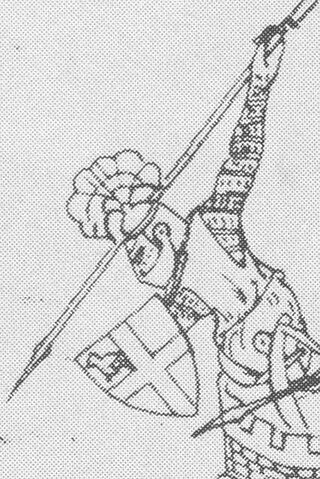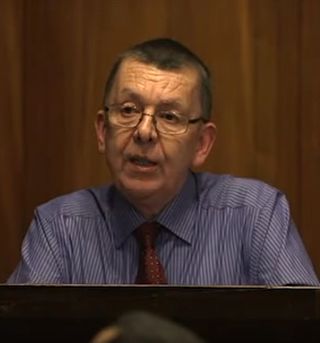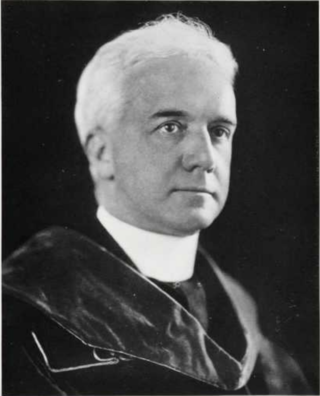Related Research Articles

Frederick Charles Copleston was an English Roman Catholic Jesuit priest, philosopher, and historian of philosophy, best known for his influential multi-volume A History of Philosophy (1946–75).
Theology is the study of religious belief from a religious perspective. More narrowly it is the study of the nature of the divine. It is taught as an academic discipline, typically in universities and seminaries. It occupies itself with the unique content of analyzing the supernatural, but also deals with religious epistemology, asks and seeks to answer the question of revelation. Revelation pertains to the acceptance of God, gods, or deities, as not only transcendent or above the natural world, but also willing and able to interact with the natural world and to reveal themselves to humankind.
Alexander Neckam was an English magnetician, poet, theologian, and writer. He was an abbot of Cirencester Abbey from 1213 until his death.

Andrew Harclay, 1st Earl of Carlisle, alternatively Andreas de Harcla, was an important English military leader in the borderlands with Scotland during the reign of Edward II. Coming from a knightly family in Westmorland, he was appointed sheriff of Cumberland in 1311. He distinguished himself in the Scottish Wars, and in 1315 repulsed a siege on Carlisle Castle by Robert the Bruce. Shortly after this, he was taken captive by the Scots, and only released after a substantial ransom had been paid. His greatest achievement came in 1322, when he defeated the rebellious baron Thomas of Lancaster at the Battle of Boroughbridge on 16–17 March. For this he was created Earl of Carlisle.

The British Academy for the Promotion of Historical, Philosophical and Philological Studies is the United Kingdom's national academy for the humanities and the social sciences. It was established in 1902 and received its royal charter in the same year. It is now a fellowship of more than 1,000 leading scholars spanning all disciplines across the humanities and social sciences and a funding body for research projects across the United Kingdom. The academy is a self-governing and independent registered charity, based at 10–11 Carlton House Terrace in London.

Sir Anthony John Patrick Kenny is a British philosopher whose interests lie in the philosophy of mind, ancient and scholastic philosophy, the philosophy of religion, and the philosophy of Wittgenstein of whose literary estate he is an executor. With Peter Geach, he has made a significant contribution to analytical Thomism, a movement whose aim is to present the thought of St. Thomas Aquinas in the style of analytic philosophy. He is a former president of the British Academy and the Royal Institute of Philosophy.

The Summa contra Gentiles is one of the best-known treatises by Thomas Aquinas, written as four books between 1259 and 1265.

Francisco Suárez, was a Spanish Jesuit priest, philosopher and theologian, one of the leading figures of the School of Salamanca movement. His work is considered a turning point in the history of second scholasticism, marking the transition from its Renaissance to its Baroque phases. According to Christopher Shields and Daniel Schwartz, "figures as distinct from one another in place, time, and philosophical orientation as Leibniz, Grotius, Pufendorf, Schopenhauer and Heidegger, all found reason to cite him as a source of inspiration and influence."

Bernard Joseph Francis Lonergan was a Canadian Jesuit priest, philosopher, and theologian, regarded by many as one of the most important thinkers of the 20th century.
Boetius de Dacia, OP was a 13th-century Danish philosopher.
Richard Rufus was a Cornish Franciscan scholastic philosopher and theologian.

Brian Evan Anthony Davies is a British philosopher, Roman Catholic priest, and friar. He is Distinguished Professor of Philosophy, Fordham University, and author of An Introduction to the Philosophy of Religion, now in its fourth English edition, which has been translated into five languages.
Henry (of) Harclay was an English medieval philosopher and university chancellor.
Bryson of Heraclea was an ancient Greek mathematician and sophist who studied the solving the problems of squaring the circle and calculating pi.
Robert Mascall was a medieval Carmelite friar who served as the Bishop of Hereford from 1404 to 1416.
Berthold of Moosburg was a German Dominican theologian and neo-Platonist of the 14th century, teaching in Regensburg in 1327.

Commentaries on Aristotle refers to the great mass of literature produced, especially in the ancient and medieval world, to explain and clarify the works of Aristotle. The pupils of Aristotle were the first to comment on his writings, a tradition which was continued by the Peripatetic school throughout the Hellenistic period and the Roman era. The Neoplatonists of the Late Roman Empire wrote many commentaries on Aristotle, attempting to incorporate him into their philosophy. Although Ancient Greek commentaries are considered the most useful, commentaries continued to be written by the Christian scholars of the Byzantine Empire and by the many Islamic philosophers and Western scholastics who had inherited his texts.
Joseph Koterski, S.J. was an American Jesuit priest, philosopher, author, and professor at Fordham University in the Bronx, New York.
Dominic of Flanders was a French-Flemish Dominican philosopher and Scholastic author, known to have been a renowned Thomist. His commentaries on Aristotle and on Thomas Aquinas were frequently printed, the most famous being his commentary on Aristotle’s Metaphysics. This Commentaria is commonly known to have been dedicated to Lorenzo de’ Medici.

William Coleman Nevils was an American Catholic priest and Jesuit educator who became the head of numerous Jesuit institutions throughout the northeastern United States, including Georgetown University and the University of Scranton. Born in Philadelphia, he was educated at Saint Joseph's College, before entering the Society of Jesus. While studying for the priesthood, he taught at Boston College and the Loyola School. After receiving his doctorate from Woodstock College, he held professorships at St. Andrew-on-Hudson and the College of the Holy Cross, before transferring to Georgetown University, where he became the dean of Georgetown College, the academic vice president, and the regent of the School of Foreign Service. He then left Georgetown to become the dean of the Shadowbrook Jesuit House of Studies.
References
- ↑ Dyke, Christina Van (22 June 2014). "Review of Aquinas on the Beginning and End of Human Life". NDPR. ISSN 1538-1617.
- ↑ "Bellarmine Jesuit Retreat House". www.jesuitretreat.org.
- ↑ "Midwest Jesuits Celebrate 2016 Golden Jubilarians: Mark G. Henninger, SJ". archive.jesuitsmidwest.org.
- ↑ "Profiles: Loyola University Chicago". Loyola University Chicago - Mission Integration.